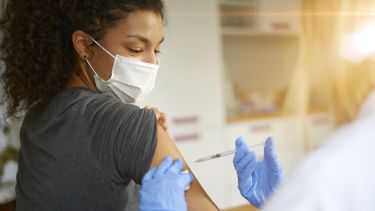- Lower levels of trust in medical establishments and government, as well as worse healthcare experiences, help to explain why there is an ethnicity gap in Covid-19 vaccination rates in the UK
- The new findings only account for a quarter of the gap, however, with researchers now urgently calling for further research to help explain the rest of the gap in vaccine uptake
- As of November 2021, white people aged 50 and over were 23 per cent more likely to have been vaccinated than black people, and eight per cent more than South Asian people
- The study also found that ethnic minorities report poorer experiences of NHS healthcare, which damages trust and leads to healthcare hesitancy beyond vaccine uptake
Worse healthcare experiences among people from ethnic minorities and lower levels of trust in government and the medical establishment explain some of the ethnicity gap in Covid-19 vaccination rates, a study has found.
Published in the journal BMJ Open, the research finds these factors account for roughly a quarter of the difference in Covid vaccine uptake between members of white ethnic groups and members of other ethnic groups. The rest of the difference still remains unexplained, which is of cause for concern among researchers.
The study was carried out by academics from the University of Sheffield and King’s College London, with the researchers saying that there is an urgent need for further research to find out what could explain the rest of the gap. Practical barriers to accessing Covid vaccination services, as well as the types of information sources being consulted, conspiracy beliefs about Covid, and attitudes to vaccination in general, might potentially explain the rest of the gap.
Like previous studies, the new research finds that people from ethnic minority groups report lower patient satisfaction and worse healthcare experiences in the UK. This latest study also finds that ethnic disparities in trust are closely related to poorer reported experiences of NHS healthcare, which highlights not only issues with vaccine uptake, but also the problem of ethnic disparities in healthcare experiences and outcomes more generally.
The findings are based on statistical analysis of survey data from 4,885 UK adults.
Dr Siobhan McAndrew, Senior Lecturer in Politics, Philosophy, and Economics at the Sheffield Methods Institute at the University of Sheffield, said: “This study is important not only because of what it tells us about health inequalities and the importance of trust, but also because our findings focus attention on what healthcare and other public institutions do in order to generate trust or distrust, especially with regard to minority groups”.
Dr Daniel Allington, lead study author and senior lecturer in social and cultural artificial intelligence at King’s College London, said: “People from other than white ethnic groups have worse experiences of NHS healthcare, and our research suggests that this may lead them to place less trust in medical authorities. This is likely to be a problem, not only for the Covid vaccination programme – which has now saved millions of lives – but also for many other public health issues.”
Contact
For further information please contact:



